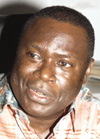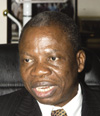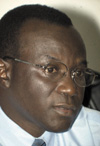The size and scale of opportunity are enormous. Critical
infrastructure, like electricity and telecommunications, does not work.
Advertisement
When the telecommunications sector was deregulated, it spawned a
cellular industry that grew from nothing to three million customers in
a little more than two years. Ambitious plans to address the country’s
housing backlog – estimated at up to eight million units – presents a
massive construction opportunity valued at up to $170bn, not to mention
stimulating industries supplying materials to the building trade.
Advertisement
If the government’s much-vaunted economic reform programme yields
results, accelerating economic growth from a pedestrian 3% per year to
a targeted 7%, the ultimate prize will be the awakening of Nigeria’s
130 million-strong consumer market. With an underdeveloped consumer
goods sector, the potential at all stages of the supply chain is vast.
Singapore-based Eurochem Technologies is at an advanced stage of
planning a $1.85bn petrochemicals plant, capitalising on low cost
access to abundant natural gas supplies to produce methanol. The
methanol will be further processed into polymers for export and for use
in plastics. Nigeria currently imports all its plastic.
Unavoidable truths
However, there are some unavoidable truths about Nigeria that
investors cannot ignore. First, corruption is real, it exists at all
levels and is difficult to avoid. Government rhetoric is staunchly
anti-corruption and it continues to increase resources to
anti-corruption agencies but, despite small victories, the practice
remains widespread.
Second, security is a problem. Crime is an issue, particularly in the
commercial centre Lagos. The British Foreign Office warns that violent
street crimes, armed robberies, muggings and car-jackings are
“prevalent” in Lagos while hostage-taking for ransom may occur in the
states of Delta, River and Bayelsa.
The situation is not as bleak as the travel advisories warn – being
sensible and suitably cautious eliminates most dangers – but many
companies still consider it necessary to provide beefed-up private
security to their employees. Intimidation and Mafia-style tactics are a
concern – a factor allied to corruption. Factional violence in outlying
areas rarely affects the main urban centres but operations in those
regions could be at risk.
Third, the quality of infrastructure is dire. Power failures are
routine – often two or three times a day. The fixed line telephone
network is totally inadequate. Market distortions in the refining and
petroleum industry mean fuel supplies to outlying areas are irregular.
The ports are chaotic, while clearing goods through customs can take
months. The transport infrastructure is creaking, which presents
difficult logistical challenges. All of this pushes up the cost of
doing business in Nigeria.
New stability
Crucially, however, the country and its political system are
largely stable. Earlier this year, democratic elections were held for
the second time since civilian rule was restored in 1999. Despite
accusations of irregularity and predictable logistical hassles, the
results were accepted and President Olusegun Obasanjo won a second
term.
Following nearly four decades under successive military regimes,
Nigeria has walked out of the shadows and into the spotlight.
Increasingly, the country is an important continental player. Mr
Obasanjo was a key architect of the New Economic Plan for Africa’s
Development (NEPAD) along with South Africa’s president Thabo Mbeki. Mr
Obasanjo is also a leading figure in the Commonwealth and earlier this
year he received US President George W. Bush in the capital, Abuja, a
sign of Nigeria’s growing international status.
But it will come to nothing if Mr Obasanjo cannot remedy the country’s
economic ills. Despite the world’s eighth largest proven reserves of
oil and fifth largest proven reserves of gas, 60% of the population
lives below the poverty line. An unproven but widely believed statistic
is that there are more dollar millionaires in Nigeria than there are in
the UK, indicative of the yawning gap in income and wealth equality.
Depending on the source, unemployment runs at between 20% and 30%, and
what little income Nigerians do generate is being eroded by inflation.
The country’s once efficient education system is now in decline,
prompting many wealthy Nigerians to send their children abroad to be
educated.
Citizens let down
Why did this resource-rich country fail to deliver prosperity to
all its citizens? Professor Mfon Amana, chairman of the Nigerian
Investment Promotion Commission, places the blame squarely at the door
of the former military rulers. “The military do not know how to govern;
they only know how to plunder and steal. It was an attitude that
filtered down to all levels of government and the public sector.”
Mfon Amana: the military do not know how to govern
Apart from a few pockets of success, Mr Obasanjo’s first term in
office was mediocre. Supporters contend that his hands were full
holding together a fractious country and more far-reaching reforms were
impossible. Critics would prefer him ousted from office.
Undeterred, Mr Obasanjo is stepping up the pace of reform. The
centrepiece is a far-reaching economic reform programme. The first step
is narrowing the budget deficit from the current level of 4%-5% of GDP,
which is designed to lower debt costs and unlock funds for capital
investment. Aggregated expenditure will be planned on the basis of an
“oil price-based rule”, which is intended to ensure predictability of
government revenues and in turn restrict expenditure programmes to be
in line with revenues. Debt will be serviced as part of a wider
campaign to improve Nigeria’s reputation among international creditors.
At the same time, there are plans to reform the public sector,
ultimately reducing payroll expenses and general overheads. Capital
expenditure will be exclusively targeted to priority areas:
infrastructure, education, healthcare, security and improving the
quality of national statistics.
Efforts to improve the investment climate are being made at macro level
– improving the macroeconomic fundamentals – but also at micro level
where, for instance, the aims are to lessen bureaucracy and provide
targeted incentives and concessions. Priority economic sectors include
oil and gas, agriculture, manufacturing, solid minerals mining and
beneficiation, and tourism. The focus is on completing projects and
ensuring accountability.
“The president is fully backing this and we have started sensitising
the party,” says Agusto Bode of the Finance Ministry’s Budget Office.
“Nigerians believed they could spend their way out of economic decline.
But if you go to the grocery store with N100, you cannot spend N140.
This is all about doing more with less. We have to spend less but
improve the quality of spending.”
In Nigeria, it is taboo to suggest the economic plan has the look of an
IMF structural adjustment or fiscal austerity plan. Such a description
is the kiss of death in a country suspicious of the motives of the
multilateral agencies. But that is what it is: decrease the size of
government, improve the quality of spending, narrow the deficit, shrink
government debt and increase capital spending on infrastructure.
A good plan
By the standards of prevailing economic orthodoxy, it’s a good
plan, and the president has enrolled a legion of independent-thinking
technocrats to implement it who are largely unsullied by the past. Mr
Bode is a veteran of the private sector, with stints at
PricewaterhouseCoopers and Citibank behind him. But the challenge is
less in the design of the plan than in its implementation.
The government’s plan has been attacked in the press, getting short
shrift from some commentators. “The problem is that the government is
trying to do too many things, achieve too much, and it will end up not
achieving anything at all. It should be focusing on getting a few of
the important things done,” says Frank Aigbogun, publisher and CEO of
Business Day newspaper.
The government is squaring up for a fight, however. Recently it began
deregulation of the downstream oil sector to howls of protest from
consumers. Controls on the retail price of fuel have been removed, a
tactic designed to stimulate investment in new refining capacity.
Because the government-set pump price was lower than the cost of
production, there was under-investment on the supply side, leading to
frequent fuel shortages. With this control eliminated, prices are set
by the market. This led to a spike in prices in the short term but
ultimately provides the economic incentive to increase capacity.
Though hailed by economists, deregulation has sparked widespread anger
from consumers, who now have to shoulder higher fuel prices. It is easy
to dismiss this as a simplistic misunderstanding of the economics of
supply, but the bitterness against the policy stems also from
deep-seated distrust of government and its ability to fulfil promises.
The fear is that fuel prices will rise but the supply of fuel will not.
Yet, in the face of criticism, the government’s resolve has not wavered.
Funsho Kupolokun: mandate to deregulate the market
In similar a vein, the appointment of Funsho Kupolokun to head up
the Nigerian National Petroleum Corporation (NNPC), the state oil
company, is instructive. This former special adviser to the president,
known for his strong push for deregulation, was handpicked by Mr
Obasanjo. Mr Kupolokun’s express mandate is to deregulate the market
aggressively, increase production and improve transparency.
Targeting foreigners
This is part of a wider objective to increase dramatically foreign and
domestic participation in the oil and gas sector. Pragmatically, the
government has realised that the best way to break the culture of
cronyism and the cabals of influence is to throw the market wide open.
Oil and gas account for 20% of GDP, 95% of foreign exchange earnings
and up to two-thirds of government revenue.
The government faces many more stern tests. The pace of privatisation
must be stepped up. The botched attempt to sell off Nigerian
Telecommunications Limited last year, when the preferred bidder failed
to raise financing, seemed to confirm fears that the government was
incapable of effectively arranging the sale of its largest state-owned
companies. Privatisation of key enterprises, such as the Nigerian
Electrical and Power Authority, the NNPC, refineries and steel
companies, is absolutely crucial, not just to meet objectives of
shrinking the public sector but, more importantly, to ensure adequate
provision of these most basic services.
Julius Bala: privatisation critical to government’s economic agenda
Doctor Julius Bala, director general of the Bureau of Public
Enterprises, is emphatic that privatisation is a critical aspect of the
government’s economic agenda, and that transparency and accountability
will be key factors in implementing the programme. Privatisation will
go ahead, he says.
Pot of gold
In Abuja and Lagos, there is a distinct mood of anticipation. The flood
of potential investors that swarmed to the country in 1999 with the
advent of civilian rule has slowed to a gentle stream, not because of a
dearth of opportunities but rather because capitalising on these
opportunities needs experienced hands. The challenges are great but
equally there is a mood that to sit on the sidelines for too long would
risk missing the pot of gold.
It is Friday night at Murtala Mohammed international airport outside
Lagos and flights to the UK, Italy, France, Germany, Holland and South
Africa are all departing within an hour of each other. The passengers
are mostly Nigerians – the country’s flag carrier, Nigeria Airways,
collapsed under huge debts, mismanagement and rumoured corruption
earlier this year. But there is more than a smattering of non-Nigerians
and many of these reveal themselves to be prospective investors,
expatriate managers and salespeople. Some show near indecent glee at
the potential they have struck in Nigeria; many are reluctant to share
their story of good fortune for fear of letting slip their secret. For
these pioneers, sitting on the sidelines was not an option.


